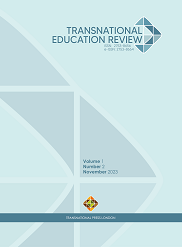Social-integration courses serve as a bridging function for migrants by increasing peer support and life learning opportunities
Social-integration courses serve as a bridging function for migrants by increasing peer support and life learning opportunities
Author(s): Emel Kılıç, Wolfgang JacquetSubject(s): School education, Adult Education, Migration Studies, Inclusive Education / Inclusion, Sociology of Education, Identity of Collectives, Asylum, Refugees, Migration as Policy-fields
Published by: Transnational Press London
Keywords: Cultural-social integration; peer support; Turkish-speaking migrants; lifelong learning; Flemish society EU;
Summary/Abstract: Although migration and people’s encounters with other cultures are significant life events, factors that influence migrants’ relationships with host countries remain understudied. This study examined the socio-cultural integration of Turkishspeaking migrants in Belgium from their perspective, using a holistic approach for participants to share their stories. Fiftynine Turkish-speaking migrants with different religious, national, and regional backgrounds who attended common classes in a (mixed) social integration course in Antwerp participated in the study. They were subdivided into six focus groups for interviews, which allowed participants to deconstruct their knowledge of local people, their subjective beliefs, and prejudices that separated them from other cultures. We found the focus-group interviews to be valuable interventions in the integration process. The study recommends that those who organise integration courses for migrants should approach this process with kindness, empathy, and an open mind.
Journal: Transnational Education Review
- Issue Year: 1/2023
- Issue No: 2
- Page Range: 79-94
- Page Count: 16
- Language: English

